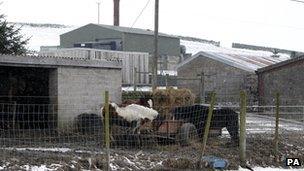Horsemeat scandal: FSA inquiry 'will be relentless'
- Published
Andrew Rhodes, FSA: "We'll keep pursuing this until there is nothing left to find"
The inquiry into claims of horsemeat mislabelling will be "relentless", the Food Standards Agency (FSA) says.
It comes after a slaughterhouse in Todmorden, West Yorkshire and a meat firm near Aberystwyth were raided by FSA officials supported by police.
The FSA suspended operations at both raided premises and seized paperwork.
Downing Street says it would be "totally unacceptable" if UK businesses were defrauding the public by passing off horsemeat as beef.
Meanwhile, wholesalers Makro has announced that a brand of beef burgers they stocked has tested positive for horse. The firm had removed all frozen beef burgers from sale in January in order to test them.
"One brand Unger beef burgers 48/4oz supplied by Silvercrest Foods did contain a trace of horse. We no longer sell the Unger product," a spokesman said.
'No risk'
The horsemeat scandal began last month when Irish authorities discovered horsemeat in some burgers stocked by a number of UK supermarket chains.
Horsemeat has also been found in branded and supermarket-own ready meals, including lasagne and spaghetti bolognese. Some Findus frozen beef lasagne, made by a French food processing company, were found to have up to 100% horsemeat in them.
The crisis has spread across Europe as details of the convoluted supply chain in the meat industry emerged.
The FSA in the UK has ordered food businesses to carry out tests on all processed beef products and the first results are expected on Friday. They are testing for the presence of horsemeat and pork.
More than 12 food firms met Food Minister David Heath on Wednesday and they reassured him their tests would be completed by Friday.
Dafydd Raw-Rees, Farmbox Meats: "No cross contamination"
The FSA also ordered an audit of all horse-producing abattoirs in the UK.
Mr Rhodes told the BBC the raids on Tuesday were a result of those investigations, and his officers had returned to the premises on Wednesday morning.
"What we found was a quantity of horsemeat sent to a factory in west Wales and used in beef products when it shouldn't have been," he said.
What is not known is whether it was deliberate or a mistake, he said.
"We've been very relentless in this," he added. "We'll continue following it through until there is nothing left to find."
Mr Rhodes said consumers had every right to expect a product to be exactly what it said on the label, but no evidence of a food safety risk had been found so far.
The FSA regularly tested a broad change of facilities, he added, and retailers and manufacturers were now being asked to routinely send their test results to the agency for assessment.
'True picture'
The raided premises were Peter Boddy Licensed Slaughterhouse, in Todmorden, West Yorkshire, and Farmbox Meats Ltd, of Llandre near Aberystwyth.

Peter Boddy Slaughterhouse in West Yorkshire is one of the UK firms under the spotlight
The West Yorkshire plant is thought to have supplied horse carcasses to the Aberystwyth firm, which were then allegedly sold on as beef for kebabs and burgers.
Mr Boddy said he was co-operating with the FSA and officials were "welcome to visit" his premises whenever they wanted.
Dafydd Raw Rees, of Farmbox Meats, said the firm was licensed to deal with horses and it had been cutting horsemeat, from the Republic of Ireland for export to Belgium, for the last three weeks.
"I get paid to do the cutting up. We don't do kebabs, mincemeat or beef burgers. This is not a processing plant," he said.
Environment Secretary Owen Paterson will travel to Brussels on Wednesday for a meeting of European countries caught up in the horsemeat scandal.
Ministers from the Irish Republic, France, Romania, Luxembourg, Sweden and Poland will attend.
Shadow environment secretary Mary Creagh said she wanted Mr Paterson to come back from Brussels having secured a European-wide testing regime.
"It's clear this is not just a UK problem or an Irish problem," she said. "About 16 countries have received defective products from Findus and are recalling them.
"In order to build a true picture of how far the adulteration has gone, other European countries have to start the testing we have done here."
She also said testing in the UK needed to be reinforced. Councils have had their budgets cut, so trading standards staff had to prioritise food safety and checking takeaways, she added.
The FSA has not tested for horsemeat since 2003.
Lord Rooker, chairman of the FSA, told a committee of MPs last month: "The last time the Food Standards Agency tested for horsemeat, we did it on the basis of evidence and intelligence that we had received."
The FSA says it tested almost 80,000 samples of food last year and focuses "on those risks that can make people ill or worse" including looking for arsenic and listeria.